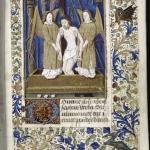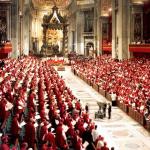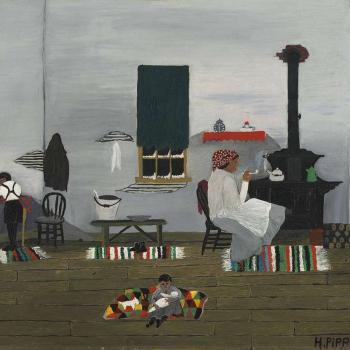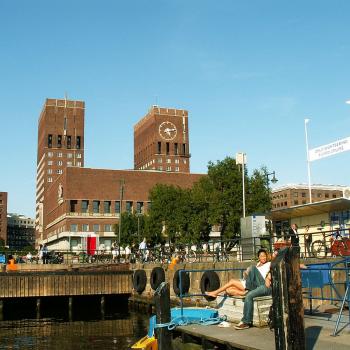The buck stops at God. All property is God’s; we are merely allowed to steward it, or, in Thomas’ language, “[t]hings which are of human right cannot derogate from natural right or Divine right.” Property rights exist to help man succor his needs, that is, to allow for human flourishing. As we saw in Ambrose, however, they do not exist to the end of luxury. If one man’s hoarding too much puts another in danger, the human decision to divvy up property in x or y is abrogated by the fact that all belongs to the Lord. This, of course, does not mean that there is no place for property (not even a Marxist would say there’s no need to have personal property, though that is a discussion for another time); rather, the point is that private property is not inviolable, or even really sacred. It is a human construct. Dom Bede Jarrett, O.P. summarizes the Scholastic opinion on this very well:
[I]t depended on specific conditions and stages of development. Thus nature dictated no division of property, though it implied the necessity of some property; the need of the division was only discovered when men set t work to live in social intercourse. Then it was found that unless divisions were made, existence was intolerable; and so by human convention, as St. Thomas sometimes say, or by the law of nature [Jarrett reads this as the same as the ius gentium], as he elsewhere expresses it, the division into private property was agreed upon and took place. (Medieval Socialism 77)
This view remains in more recent documents. Take, for example, Pope Leo XIII’s Rerum Novarum, which is often cut up to make it seem as if it is an argument for the absolute sanctity of private property. Let us examine a longer section:
With reason, then, the common opinion of mankind, little affected by the few dissentients who have contended for the opposite view, has found in the careful study of nature, and in the laws of nature, the foundations of the division of property, and the practice of all ages has consecrated the principle of private ownership, as being pre-eminently in conformity with human nature, and as conducing in the most unmistakable manner to the peace and tranquillity of human existence. The same principle is confirmed and enforced by the civil laws-laws which, so long as they are just, derive from the law of nature their binding force. The authority of the divine law adds its sanction, forbidding us in severest terms even to covet that which is another’s: “Thou shalt not covet thy neighbour’s wife; nor his house, nor his field, nor his man-servant, nor his maid-servant, nor his ox, nor his ass, nor anything that is his.”(2)
The rights here spoken of, belonging to each individual man, are seen in much stronger light when considered in relation to man’s social and domestic obligations. In choosing a state of life, it is indisputable that all are at full liberty to follow the counsel of Jesus Christ as to observing virginity, or to bind themselves by the marriage tie. No human law can abolish the natural and original right of marriage, nor in any way limit the chief and principal purpose of marriage ordained by God’s authority from the beginning: “Increase and multiply.”(3) Hence we have the family, the “society” of a man’s house – a society very small, one must admit, but none the less a true society, and one older than any State. Consequently, it has rights and duties peculiar to itself which are quite independent of the State.
That right to property, therefore, which has been proved to belong naturally to individual persons, must in like wise belong to a man in his capacity of head of a family; nay, that right is all the stronger in proportion as the human person receives a wider extension in the family group. It is a most sacred law of nature that a father should provide food and all necessaries for those whom he has begotten; and, similarly, it is natural that he should wish that his children, who carry on, so to speak, and continue his personality, should be by him provided with all that is needful to enable them to keep themselves decently from want and misery amid the uncertainties of this mortal life. Now, in no other way can a father effect this except by the ownership of productive property, which he can transmit to his children by inheritance. A family, no less than a State, is, as We have said, a true society, governed by an authority peculiar to itself, that is to say, by the authority of the father. Provided, therefore, the limits which are prescribed by the very purposes for which it exists be not transgressed, the family has at least equal rights with the State in the choice and pursuit of the things needful to its preservation and its just liberty. We say, “at least equal rights”; for, inasmuch as the domestic household is antecedent, as well in idea as in fact, to the gathering of men into a community, the family must necessarily have rights and duties which are prior to those of the community, and founded more immediately in nature. If the citizens, if the families on entering into association and fellowship, were to experience hindrance in a commonwealth instead of help, and were to find their rights attacked instead of being upheld, society would rightly be an object of detestation rather than of desire. (Rerum Novarum 11-13)













